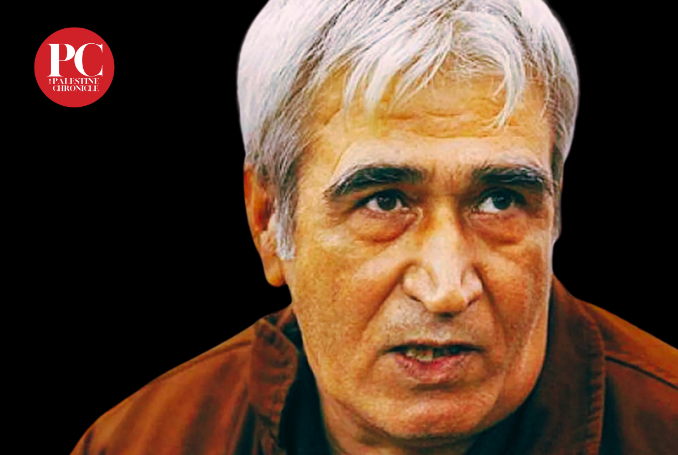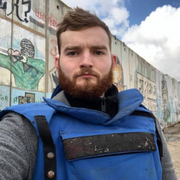
Ahmad Sa’adat, otherwise known as Abu Ghassan, is viewed as one of the most dangerous Palestinian political leaders to Israel and is prioritized for release in any Hamas-Israel prisoner exchange.
As the head of the Popular Front for the Liberation of Palestine (PFLP), Sa’adat could hold the cards to radically transform his organization when released from illegal Israeli military detention.
Born in 1953, Ahmad Sa’adat was raised in al-Bireh city – located close to Ramallah in the occupied West Bank.
Having been involved in the Palestinian students’ movement, he gravitated towards politics and joined the Popular Front for the Liberation of Palestine (PFLP) in 1969, just two years after the Marxist-Leninist political party was formed by its then Secretary-General George Habbash.
In 1975, Sa’adat graduated from UNRWA Teachers College in Ramallah, specializing in Mathematics.
Jailed Popular Front leader Calls on PA to Support Al-Quds Intifada
Abu Ali Mustafa
Receiving notice for his shrewd political mind, he began to rise in the ranks of the PFLP and was imprisoned repeatedly by the Israeli occupation forces for a total of roughly 10 years, prior to his rise to public prominence in the early 2000s.
Ahmad Sa’adat took over as Secretary-General of the PFLP in August of 2001, after Israel assassinated his predecessors by using an Apache Helicopter to fire a missile into the office of Abu Ali Mustafa in Ramallah.
Following the martyrdom of the PFLP’s leader, Abu Ali Mustafa, the group’s armed wing, which had gone by the name ‘The Red Eagles Brigades’, changed its name to the Abu Ali Mustafa Brigades and carried out a revenge assassination against a high-profile Israeli target. The PFLP assassinated extremist Israeli Tourism Minister, Rehavam Ze’evi, killing him at the Hyatt hotel in occupied Jerusalem in October 2001.
The Israeli regime has accused Ahmad Sa’adat of helping to mastermind the assassination of the Israeli former tourism minister, who was openly pro-ethnic cleansing.
Palestinian Authority
By November, just weeks after the operation was carried out, Palestinian Authority (PA) forces began rounding up members of the PFLP and holding them in their detention, against the will of the PA’s own courts, which made it appear that the PA was acting on Israeli orders to go after the PFLP’s members for the revenge operation in Jerusalem.
In January of 2002, at a time when Sa’adat had remained in hiding, a leader of the PA’s intelligence branch, Tawfiq Tirawi, arranged a meeting with the PFLP leader in order to allegedly discuss the issue of the PA’s arrests.
Ahmad Sa’adat was instead detained by the PA and transferred to the PA President Yasser Arafat’s headquarters, named the Muqata’a, where he remained until the compound was besieged by the Israeli military due to the refusal of Arafat to give up Ahmad Sa’adat and others hosted there.
After a 33-day siege and curfew imposed on Ramallah, the PA President agreed to major concessions with the Israelis and ordered the transfer of Sa’adat, along with the other men, to the PA’s nominally run Jericho-based detention center.
Martin Luther King, Ahmad Sa’adat, and the Resilience of Political Prisoners
Palestinian Legislative Council
In January of 2006, from within the PA’s prison, Ahmad Sa’adat ran for and was elected as a member of the Palestinian Legislative Council (PLC). This 2006 legislative election was famous for being the last democratic election in Palestine, after Hamas had managed to emerge victorious.
The Hamas movement had declared, at the time, that they had intended to release the PFLP secretary general, which is speculated to be the reason why Israeli forces decided to invade the prison in which Sa’adat was held on March 14, 2006.
The Jericho-based prison was supposed to be under the control of the PA, but only 15 minutes after UK and US observers, who were based at the facility, had departed from the jail, Israeli forces burst in.
The PA forces almost immediately surrendered, while many of the prisoners chose to fight back against the invading Israeli forces.
One of those who refused to hand himself over was Ahmad Sa’adat, who was eventually kidnapped by Zionist armed forces as part of their “Operation Bringing Home The Goods”.
Solitary Confinement
In 2008, the Israeli military prison system declared that they would be keeping Sa’adat under their detention for at least 30 years, then proceeded to transfer him in and out of solitary confinement.
In 2011, when Hamas managed to exchange over 1,000 Palestinian political prisoners for an Israeli captured soldier, Gilat Shalit, Ahmad Sa’adat was listed as a high-valued name on the list of those whom the Resistance demanded to be released, yet he was left out of the deal in the end.
That same year, Ahmad Sa’adat led a prominent hunger strike against deteriorating conditions in prison, to which the Israeli prison authorities responded by placing him in solitary confinement again until 2012.
Earlier this year, in May, the PFLP’s Secretary General was again transferred to solitary confinement, amidst concerns for his deteriorating health conditions.
The story of Ahmad Sa’adat symbolizes many elements of the Palestinian struggle to the occupied nation, including Israeli brutality, torture, betrayal by the Palestinian Authority and the will to never surrender against seemingly insurmountable odds.
It is believed that Hamas will demand that Sa’adat is freed in the much-anticipated future prisoner exchange, which many believe will help to strengthen and revitalize the PFLP as a political party in occupied Palestine.
(The Palestine Chronicle)

– Robert Inlakesh is a journalist, writer, and documentary filmmaker. He focuses on the Middle East, specializing in Palestine. He contributed this article to The Palestine Chronicle.







